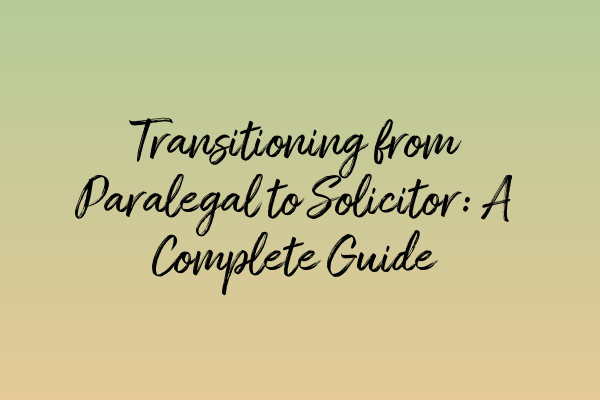Transitioning from Paralegal to Solicitor: A Complete Guide
Are you a paralegal looking to take the next step in your legal career and become a solicitor? Transitioning from paralegal to solicitor is an exciting and rewarding journey that requires careful planning and preparation. In this comprehensive guide, we will walk you through the steps and provide you with valuable insights to help you achieve your goal.
1. Understand the Solicitor’s Regulation Authority (SRA) Requirements
The first step in your transition is to familiarize yourself with the requirements set by the Solicitor’s Regulation Authority (SRA). The SRA is the regulatory body for solicitors in England and Wales and they set the standards and qualifications necessary to practice as a solicitor.
Make sure you understand the academic requirements, which typically include completing a Qualifying Law Degree (QLD) or a Graduate Diploma in Law (GDL) if your previous degree is in a non-law subject. You will also need to complete the Legal Practice Course (LPC) and secure a training contract with a law firm.
For more details on the SRA requirements, you can refer to their official website here.
2. Networking and Building Professional Relationships
Networking is a vital aspect of any legal career, and it becomes even more crucial when transitioning from a paralegal to a solicitor. Establishing professional relationships with solicitors, barristers, and other legal professionals can open doors and provide you with valuable guidance and opportunities.
Attend legal events, join professional organizations, and participate in online forums and social media groups related to your area of interest. Building a strong network will not only enhance your chances of securing a training contract but also help you throughout your career as a solicitor.
3. Gain Practical Experience
While working as a paralegal, it’s essential to gain as much practical legal experience as possible. Look for opportunities within your current firm or seek internships or pro bono work in other law firms. This hands-on experience will strengthen your application for a training contract and give you valuable insight into the day-to-day responsibilities of a solicitor.
Additionally, consider specializing in a specific area of law. Becoming an expert in a particular field can set you apart from other aspiring solicitors and increase your chances of securing a training contract in your desired practice area.
4. Enhance Your Legal Knowledge
Aspiring solicitors should always strive to deepen their legal knowledge. Stay updated with the latest developments in the law, especially within your chosen practice area. This can be achieved through reading legal publications, attending seminars, and completing relevant legal courses.
Utilize online resources such as legal blogs, podcasts, and webinars to stay informed and expand your knowledge base. A well-rounded understanding of the law will not only impress potential employers but also equip you to handle complex legal matters as a solicitor.
5. Tailor Your CV and Cover Letter
When applying for training contracts, it’s crucial to tailor your CV and cover letter to highlight your relevant skills, experiences, and achievements. Emphasize any legal research, drafting, or client interaction you have undertaken as a paralegal.
Incorporate keywords that are relevant to the legal industry and the specific practice area you wish to pursue. This will help optimize your CV for online job searches and improve your chances of being noticed by potential employers.
For additional tips on crafting a compelling CV and cover letter, check out our article on Private Prosecutions: Exploring Non-Governmental Prosecutions in Criminal Cases.
6. Prepare for Interviews and Assessments
Once you secure an interview for a training contract, it’s crucial to prepare thoroughly. Research the law firm and tailor your answers to demonstrate your knowledge of their practice areas and values.
Practice answering competency-based interview questions and be prepared to provide examples of how you have demonstrated key skills such as teamwork, communication, and problem-solving.
Additionally, some law firms may require you to complete assessments, such as case studies, presentations, or written exercises. Familiarize yourself with these types of assessments and practice under timed conditions to improve your performance.
7. Stay Resilient and Persevere
The journey from paralegal to solicitor can be challenging and competitive. It’s essential to stay resilient, persevere through setbacks, and learn from each experience.
Seek feedback from unsuccessful applications or interviews to identify areas for improvement. Use each opportunity as a learning experience and continue to develop your skills and legal knowledge.
Remember, success may not come overnight, but with dedication, persistence, and a strong work ethic, you can achieve your goal of becoming a solicitor.
For more valuable resources and insights on the legal profession, our blog offers a wide range of articles, including topics such as:
- Ethical Challenges in Criminal Defence: Navigating Dilemmas
- Understanding Drug-related Offences: Laws and Penalties in the UK
- Magistrates’ Court vs Crown Court: Different Paths in Criminal Proceedings
- Criminal Defence Strategies: Expert Approaches to Protecting Clients’ Interests
Embarking on the journey from paralegal to solicitor requires dedication, perseverance, and continuous learning. By following the steps outlined in this guide, you will be well on your way to achieving your goal and building a successful career as a solicitor.


Leave a Reply